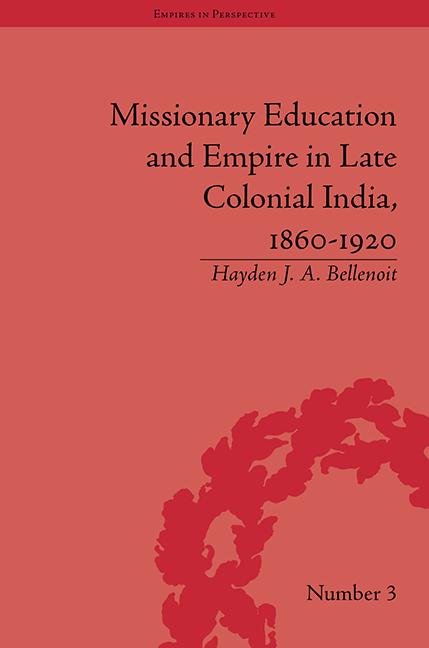Book contents
- Frontmatter
- CONTENTS
- List of Tables
- Acknowledgments
- Glossary
- List of Abbreviations
- Introduction
- 1 Knowledge, Religion and Education in Early Modern India
- 2 British Fears and Indian Society in the Emergence of North Indian Education, c. 1860–1920
- 3 Between East and West: Orientalism, Representations of and Engagements with India
- 4 The Failures of Education and its Sociological Bearings
- 5 Religious Interaction, the Curriculum and Indian Contestations of Late Colonial Knowledge
- 6 Maintaining Missionary Influence: Nationalism, Politics and the Raj c. 1870–1920
- Conclusion
- Notes
- Works Cited
- Index
3 - Between East and West: Orientalism, Representations of and Engagements with India
- Frontmatter
- CONTENTS
- List of Tables
- Acknowledgments
- Glossary
- List of Abbreviations
- Introduction
- 1 Knowledge, Religion and Education in Early Modern India
- 2 British Fears and Indian Society in the Emergence of North Indian Education, c. 1860–1920
- 3 Between East and West: Orientalism, Representations of and Engagements with India
- 4 The Failures of Education and its Sociological Bearings
- 5 Religious Interaction, the Curriculum and Indian Contestations of Late Colonial Knowledge
- 6 Maintaining Missionary Influence: Nationalism, Politics and the Raj c. 1870–1920
- Conclusion
- Notes
- Works Cited
- Index
Summary
As the previous chapter demonstrated, the UP Department of Public Instruction had to work with particular Indian social, religious and demographic realities when it came to education. Some of these were of their own making, whilst the rest were solid realities which neither the British nor missionaries could change. In turn Anglican missionary educationists from the SPG, LMS and CMS, who took greatest advantage of the system of market education, also had to work with the grain of Indian society – in particular the parameters of Hinduism and Indian religions. This was indispensable for their modus operandi of their entire educationist enterprise. One main aim of this chapter is to outline how these schoolteachers and missionary scholars engaged with Hinduism, Indian cultural moralities, and how this was further related to the enterprise of education. It will define missionary education's aims and functioning in the classroom as part of the colonial encounter. Our historical literature has still, to a degree, tended to view mission education as either synonymous with that of Government or chiefly concerned merely with winning converts. It has also seen missionary engagements with Hinduism and Indian Islam as largely disparaging or condescending. Yet these are both simplistic. This section seeks to examine the actual process of pedagogy, something which has largely been overlooked by scholars of both missions and India. The means by which missionary educationists engaged with India's religious landscape were instructive and significant. These headmasters and teachers saw Hinduism and India not so much as a complete ‘other’ but more through a condescending Darwinian trajectory which never irrevocably consigned India to difference. One by-product of this arrangement was that their engagements were more constructive and accommodating than more disparaging missionary figures such as Alexander Duff and William Ward would suggest. This movement towards more constructive engagements with Indian religions ultimately started to resemble, however slightly, the writings and compendiums of Indo-Muslim scholars such as Dara Shukoh and Abul Fazl. Yet what was different now was that Anglican missionaries were more numerous, elaborate and engaging than their Mughal predecessors.
- Type
- Chapter
- Information
- Publisher: Pickering & ChattoFirst published in: 2014



